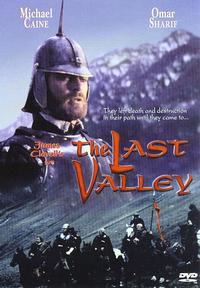- The Last Valley
Infobox Film
name = The Last Valley

image_size =
caption = DVD cover
director =James Clavell
producer = James Clavell
writer = James ClavellJ.B. Pick
narrator =
starring =Michael Caine Omar Sharif
music = John Barry
cinematography =Norman Warwick John Wilcox
editing = John Bloom
distributor =Buena Vista Pictures
released =January 28 1971
runtime = 128 mins
country = flagicon|UKUnited Kingdom
USA
language = English
budget = $11,000,000 (estimated)
preceded_by =
followed_by =
website =
amg_id = 1:28399
imdb_id = 0065969"The Last Valley" is a 1971 historical drama film directed by
James Clavell . Set during theThirty Years War , it starsMichael Caine as the leader of a band ofmercenaries , andOmar Sharif as a teacher fleeing from the violence endemic to Germany during this period. They manage to find one valley, untouched by war, in which to live in peace for a time.Plot Summary
Caine's character, known only as "The Captain," leads a band of ruthless Mercenaries. His men pillage the countryside, raping and looting freely when not engaged in actual military work. Sharif, as Vogel (German for Bird), is a former teacher who is merely trying to survive the overall slaughter taking place throughout south-central Germany. He runs from The Captain's forces, and eventually stumbles onto an idyllic mountain vale, seemingly untouched by war.
The Captain's small band are not far behind, and they too are impressed by the valley and its inhabitants, but for darker reasons. Outgunning the locals by a wide margin, he decides that his men will rest here for the winter, and wait for political events outside to turn in their favor. He forces the locals to comply, especially their headman Gruber (Nigel Davenport). The local
Catholic Priest (Per Oscarsson) is livid that a number ofProtestants (and nihilisticAtheists for that matter) are amongst the Mercenaries, but there is little he can do to sway The Captain. The Mercenaries are of one mind after The Captain kills a dissenting member of his band, and religious and ethnic divisions are irrelevant.At first, the locals accept their fate. Vogel agrees to act as intermediary, using his cunning to act as judge in matters of dispute between the Mercenaries and local people. As long as food, shelter, and a small number of comfort women are provided, the Mercenaries leave the locals alone. But as winter fades, it becomes obvious that the Mercenaries will have to leave. A man exiled from the group manages to lead a rival Mercenary band to the valley, which is no longer snowed-in. After a short, but fierce, battle in which the interlopers are destroyed, The Captain gets word that a major military campaign in the Upper
Rhineland is happening. Since his men are soldiers of fortune, he decides this is the time to leave the valley and seek combat again.At the end of the film, we see The Captain and his men engaged in a major siege operation. One by one, most of his men are killed as their side rushes the fortified gate of a major city. The Captain survives long enough to return to the valley, but soon dies from his wounds. Vogel is left to ponder the madness enveloping the world.
The film was mostly shot in
Tyrol , Austria (Trins andGschnitz and theGschnitztal Valley ) and was based on the novel byJ.B. Pick .External links
*imdb title|0065969
Wikimedia Foundation. 2010.
